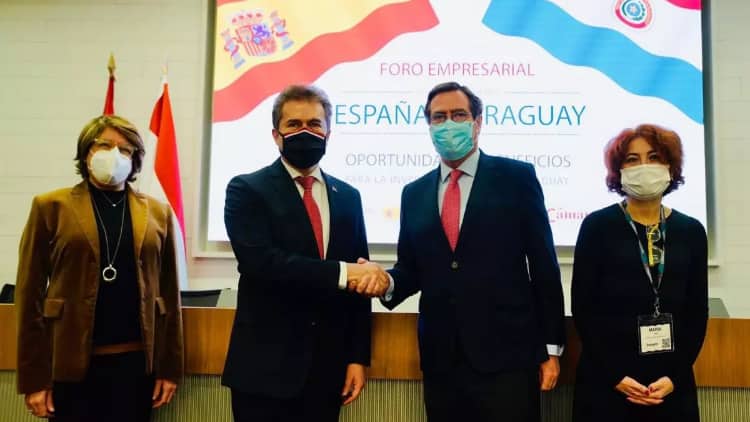The Diplomat
Spanish investment contributed some 40 billion dollars to the Peruvian economy between 1993 and 2019, which represents 1% of the country’s annual Gross Domestic Product (GDP) over that period, according to a report by the Official Spanish Chamber of Commerce in Peru and the University of the Pacific.
The document, which was presented on Monday at Casa América by the president of the Spanish Chamber, Alberto Almendres, in an event organised jointly with the Spain-Peru Council Foundation and Llorente y Cuenca, and in which executives from Spanish companies established in the Latin American country, such as BBVA, Telefónica, Indra and MAPFRE, also took part.
The report emphasises the strategic commitment made by Spanish investors, who make long-term investments and who, thanks to the capital introduced in Peru, have made it possible to create nearly 1.3 million direct and indirect jobs in the country.
According to Almendres, the report, which compiles data from different Spanish and Peruvian organisations, highlights the fact that Spanish companies contributed some 20,000 million in the 27 years studied, not only in investment, but also in reinvestment, and did not bring capital back to Spain.
This amount represents 26% of the total foreign investment received by Peru and translated into 40 billion dollars of growth in the Peruvian economy (1% of its GDP). In addition, this contribution allowed Peru to collect tax revenues equivalent to some 1.4 billion dollars.
Almendres pointed out that, at the beginning of the 1990s, the largest companies, such as Telefónica, Repsol and BBVA, which operate in the public or mass sectors, arrived in a country that had no investment culture; years later, construction companies linked to infrastructure projects did so; and, finally, following the 2008 crisis in Spain, SMEs did so. Today there are 414 Spanish companies operating in Peru, although many of them are already Peruvian companies.
After the presentation of the report, some success stories of Spanish companies in Peru were presented and a round table discussion took place with the aforementioned representatives of Spanish firms.
Oscar Díaz-Canel, Head of Public Affairs at BBVA, pointed out that the bank has six million customers and 6,000 employees, in addition to providing microfinance services to one million customers, and that 53% of those who receive microloans are women, mainly in rural areas.
Jesús Martínez-Castellano, CEO of Mapfre Latam, explained that his company has a market share of 15% in Peru, a percentage only behind that of Brazil and Mexico.
José Juan Haro, Director of Public Policy for Latam at Telefónica, explained the change that the company’s presence in Peru has meant for the country, where there are already 45,000 kilometres of fibre optics and more than 30,000 direct or indirect jobs have been created thanks to the investments made. He particularly highlighted the Internet For All project, aimed at six million people who do not have this coverage and which, in two years, has already achieved half of its objective.
Indra’s director of Institutional Relations, Alfonso Tena, spoke for Indra, who emphasised that his company provides services so that other Spanish companies can act, and affirmed that more important than the numbers is the social change that these investments made over the years have been able to bring to the people.
All agreed that beyond the political changes experienced by the country (in reference to the accession to power of the leftist Pedro Castillo), Spanish companies have the will to continue in Peru.
The Spanish ambassador to Peru, Alejandro Alvargonzález, spoke along the same lines when he closed the event. The ambassador affirmed that Spanish companies are “the most current face of a Spanish presence in Peru that has never been lacking”.
Alvargonzález acknowledged the desire of Spanish companies to achieve a bilateral agreement to avoid double taxation, as well as Peru’s aspiration to sign an agreement on air transport. He concluded by indicating that Spain enjoys a solid position in Peru, which does not prevent disputes from arising, and advocated reaching a new framework cooperation agreement with the Andean country.







